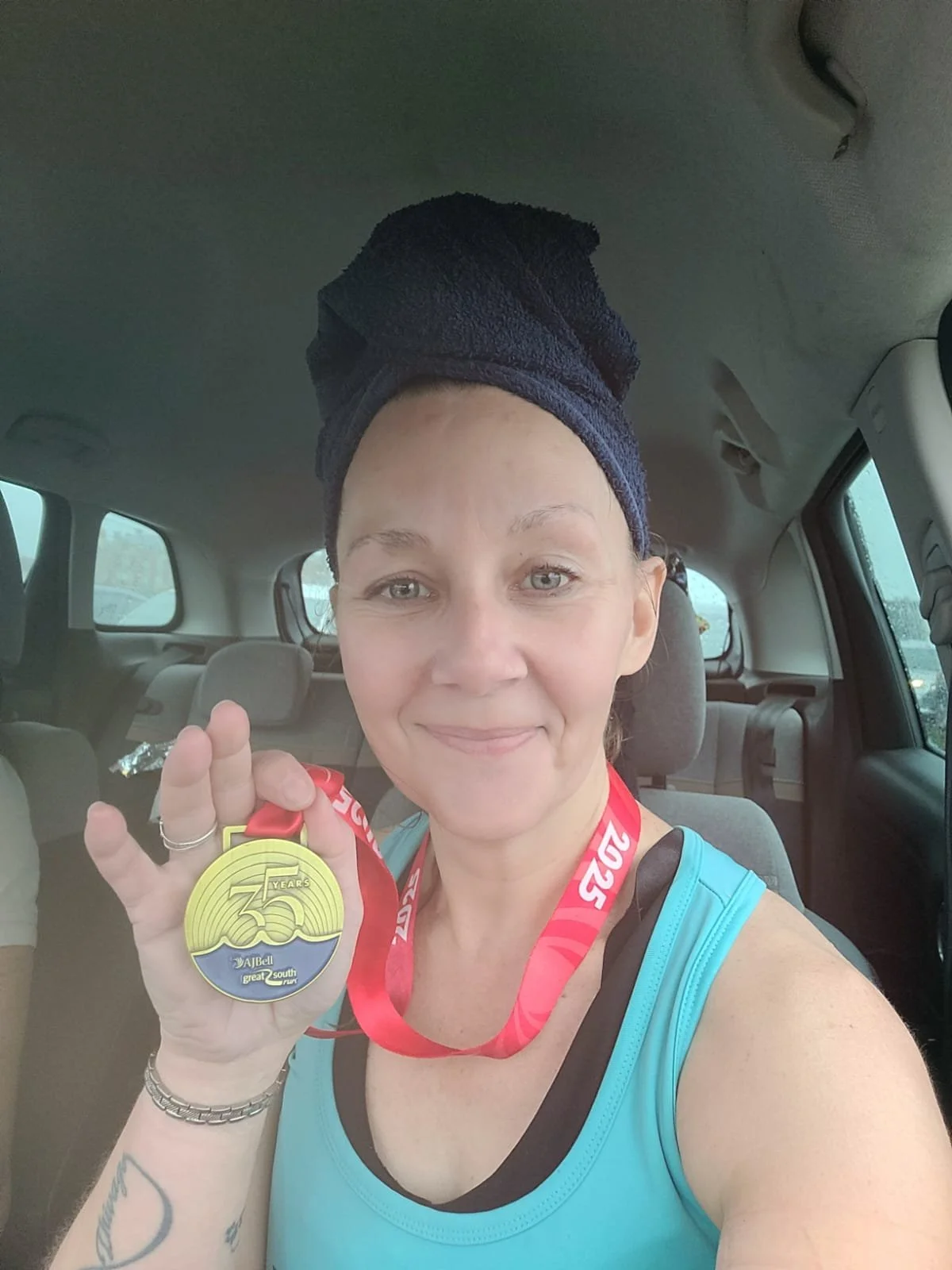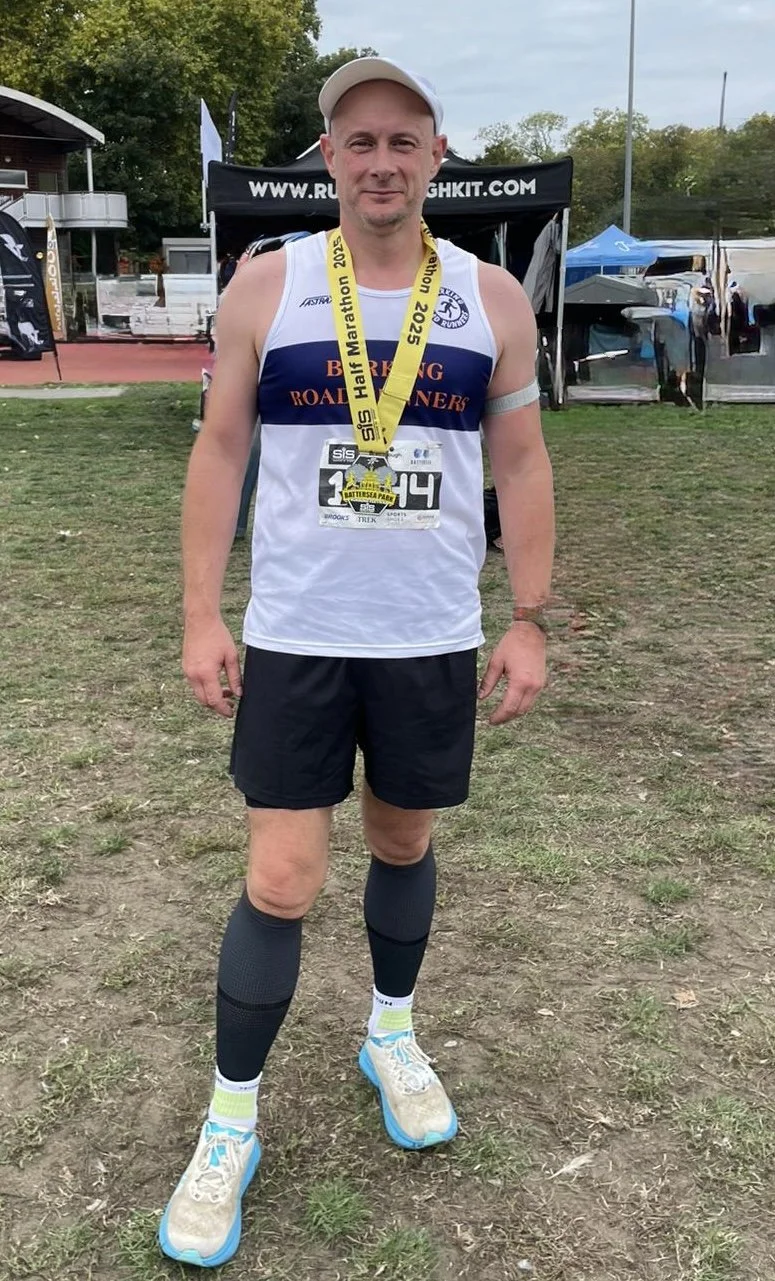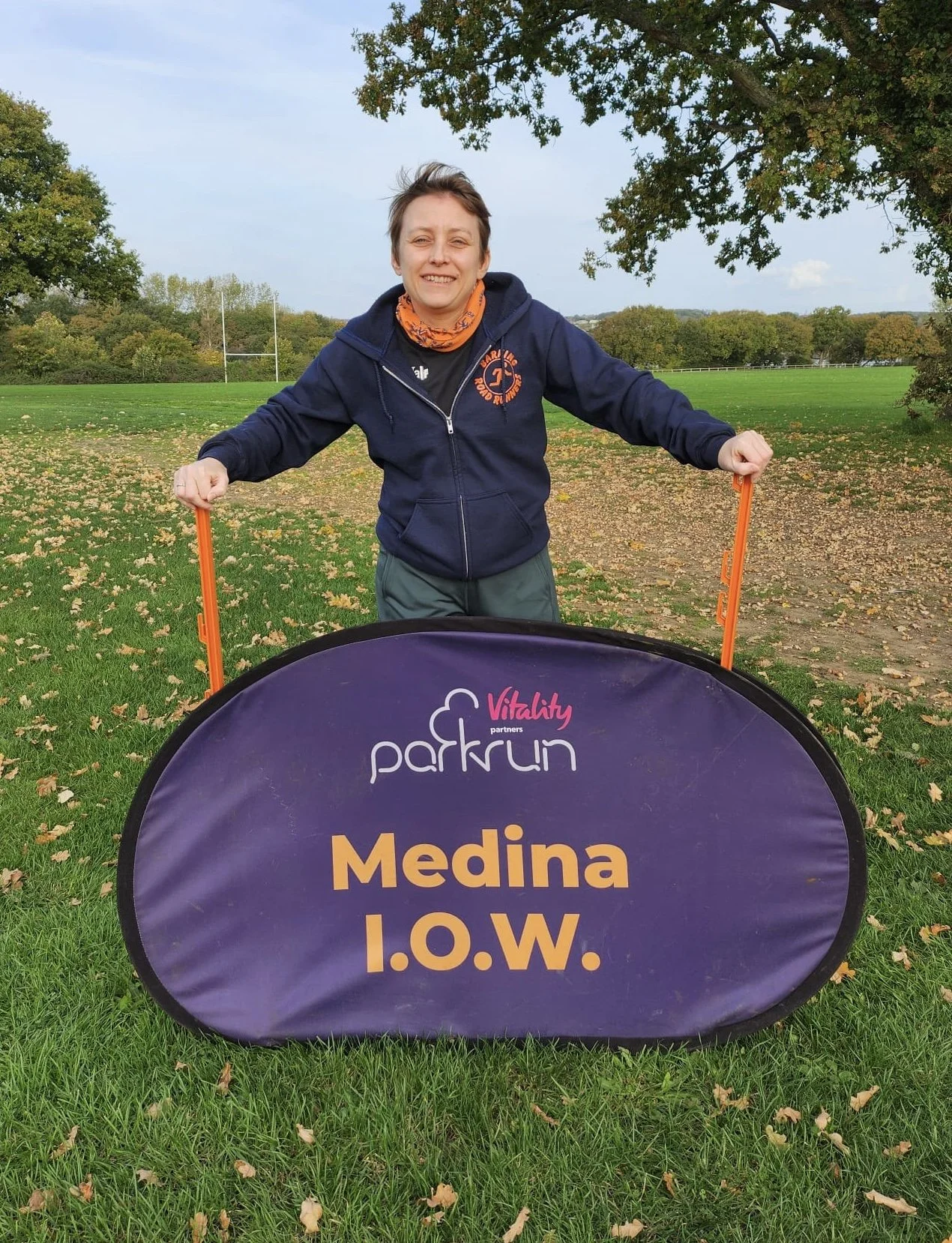BRR Blog - 20 October
Most of the BRR crew at the Great South Run
Howdie Road Runners
There were no ‘official’ club races at the weekend, but there was still some pretty impressive long distance running taking place, from the guys at the Great South Run 10-miler to Jason S’s HM to Cristina’s marathon. All the details in Greg’s Race Report, below.
In the next few weeks we are back to shorter but no less challenging racing, with both the Chingford League and the first race in this season’s South Essex Cross Country League taking place over the first weekend in November. With the rain we’ve been having over the last few days it could be mud, mud, glorious mud! In the meantime, stay in the dry and enjoy an info packed blog…
Committee Minutes
With thanks to Isabel, the minutes of the October committee meeting can be found here.
Zahra’s Uni Unload
Zahra Akram
Zahra Akram may have gone to Uni, but she hasn’t forgotten her running buddies in BRR. Here is the first article from Zahra sharing with us some of the information she has been learning on her course. And it seems we have been doing the right thing in our running drills at track.
“This week we were learning about the different types of learning theories, something that could be related to running is Bernstein’s degrees of freedom. A degree of freedom, simply put, is how many movements you have at your joints. Someone running with more degrees of freedom will be using their shoulders to help with momentum as well as their knees and ankles, whereas someone with less degrees of freedom will maybe only use their knees and try to find easier ways to do the movements.
“This theory suggests that more experienced athletes will use more degrees of freedom and so their movements will be more fluid and less stiff. In running we need to be fluid to help with being energy efficient and it can help with injury prevention and adaptability. We can increase our degrees of freedom by doing different drills such as Carioca and arm swings , these drills help to loosen the joints and it can improve stability in other areas too.”
Cape Town Cancellation
Runners from around the world were left frustrated after the 2025 Cape Town Marathon was cancelled just 90 minutes before the start due to dangerous winds.
Overnight gusts exceeding 50km/h tore through the venue, shredding tents and displacing barriers. By sunrise, the course was unsafe, and organisers had no choice but to call off the event in the interest of safety, just 90 minutes before it was due to start.
While most agreed that protecting participants came first, anger quickly followed when organisers confirmed that entry fees would not be refunded or transferred to 2026. For many, this compounded the emotional blow, especially for those who had travelled great distances and invested heavily in the race.
“It is incredibly disappointing,” said one runner, voicing the concerns of many who believed some form of compensation should have been offered.
With the marathon rescheduled for May 2026, its future status as Africa’s potential first Abbott World Marathon Major remains in question, although the CEO of AbbottWMM, who was in Cape Town for the event, said the organisers had made the right decision to cancel. For now, runners are left to process the frustration of lost opportunities and unrecoverable expenses, even as safety remains a priority.
Think Positive!
There was sad news that a runner died on the finish line of the Royal Parks HM on 12 October. And I was also a bit maudlin last week when I heard that a former colleague had died whilst out running. But it’s important to remember that this is a very rare occurrence.
The most robust estimate comes from a 2019 review in BMJ Open Sport & Exercise Medicine, which found the risk of death during a marathon to be approximately 0.67 per 100,000 finishers—or one death per 150,000 runners. Since the inaugural London Marathon in 1981, there have been 13 recorded deaths, suggesting a fatality roughly every three years. To put this into perspective, roughly five people die every day on UK roads.
With apologies for being macabre, the primary causes of running related deaths are:
Sudden Cardiac Arrest
Most common cause, especially in men and older runners.
Often linked to coronary artery disease (CAD) or hypertrophic cardiomyopathy (enlarged heart).
Exertional Heat Stroke
Occurs when body temperature exceeds 40°C.
Risk increases in hot, humid conditions.
Exercise-Associated Hyponatremia
Caused by overhydration or electrolyte imbalance.
Can lead to brain swelling and death if untreated.
Genetic Heart Conditions
Particularly in younger runners, such as hypertrophic obstructive cardiomyopathy.
This underlines the importance of ensuring you hydrate smartly, making sure you replace lost electrolytes especially during longer runs, adapting your runs to match the prevailing weather conditions, and getting any health concerns checked out.
A to Z of Running
Episode ten in the A-Z of running, and this week it is brought to you by the letter ‘J.’
Jog: A slow, steady pace of running, typically used for warm-ups, cool-downs, or low-intensity training, such as recovery runs. In terms of exertion, it is around 2-3 on the rate of perceived effort (RPE) scale.
Jogger: A person who runs at a slow or moderate pace, often for fitness or recreation rather than competition. The term was popularised in New Zealand in the 1960s by groundbreaking coach Arthur Lydiard, once named as the all-time greatest coach by Runner's World. Lydiard organised the Auckland Jogging Club, which got many non-competitive adults engaged with slow-distance running. In a visit to New Zealand, Bill Bowerman—the man who co-founded Nike —was impressed with Lydiard’s movement that he went back to the US and published a book in 1966 simply called Jogging. This was the start of the mass-market jogging boom of the 1970s, but, unfortunately, it was also the start of self-perceived ‘serious’ runners using the word ‘jogging’ as a derogatory term.
Joint Pain: Joints are where two bones meet. Joint pain is discomfort or inflammation in the joints, commonly experienced by runners due to overuse or improper form. But bear in mind, non-runners are just as likely to get joint pain as runners, so it shouldn’t discourage you from running.
someone with joint pain
Jump Squats: A plyometric exercise involving squatting and jumping explosively, used to build leg strength and power for running.
A jump squat
Junk Miles: runs added to your training that lack intention or purpose. They aren’t recovery runs, speed work, or long runs. Instead, they’re often miles tacked on because you feel like you “should” be doing more, or you simply want to keep your mileage high. If you’re running just to stay active or clear your mind, squeezing in a few miles with no goal in mind isn’t necessarily a bad thing. But these extra, unstructured runs can sap your energy, reduce time available for recovery, and increase the risk of injury, especially if you’re working toward a specific race or performance goal.
Junction: A point where running paths or trails intersect; useful for route planning or changing direction during a run. Hopefully, if you come across a junction in a race, there will be a friendly marshal telling you which way to go.
Greg’s Race Report
After last year’s cancellation due to the high winds it was finally time for Barking Road Runners members to take part in the Great South Run 10 mile race in Portsmouth. Not so windy this year but it was very wet throughout the whole race. That, however, didn’t dampen their enthusiasm.
First BRR finisher was Joyce Golder 1:42:20 followed by Rob Courtier 1:49:34, Louise Chappell 1:50:08, Dennis Spencer Perkins 1:56:46, Alison Fryatt 1:57:15, Dawn Curtis 2:02:13 and Greg Adams 2:26:24.
Louise with her Great South Run medal, and a charming towelling turban!
Cristina Cooper continued her Boston preparations by running the Abingdon Marathon finishing in a Personal Best time of 3:35:29. Despite not feeling it, Cristina’s mental fortitude saw her through. Next stop the New York Mararhon in a few week’s time.
Cristina after her Abingdon marathon
Jason Suddaby competed in his first half marathon for several years at the Battersea Park running festival, finishing in a fantastic time of 1:54:35.
Jason S at the Battersea Park running festival
BRR parkrunners
Barking - Dominic Herring 19:56, Paul Withyman 20:07, Rosie Fforde 24:47, Daniel Plawiak 25:19, George Hiller 27:25, Chris Muthaka 28:56, Lizzie-Beth Garraghan 30:12, Jason Li 30:22, Nikki Cranmer 30:30, John Lang 36:44, Darren Graham 42:37, Les Jay 45:08, Alan Murphy 52:32 and Barry Rowell 58:06.
Great Salterns - Alison Fryatt 37:27.
Alison at Great Salterns parkrun
Harrow Lodge - Rory Burr 23:44.
Keswick - Owen Wainhouse 20:54.
Lee on Solent - Louise Chappell 32:44.
Louise at Lee-on-the-Solent parkrun
Marshall Estate - Gary Harford 28:50.
Medina I.O.W - Dawn Curtis 55:36.
Dawn at Medina I.O.W parkrun
Raphaels - Doug King 27:39.
SETU Arena - Tom Shorey 26:00 and Clodagh Shorey 32:19.
Valentines - Mark New 25:01 and Kevin Wotton 25:13.
Victoria Dock - John Mitchell 23:07.
Highest BRR age gradings this week were Rosie Fforde 60.73% for the women and Paul Withyman 69.93% for the men.
BRR Diary – October/November
The highlights of the coming weeks are listed below but you can see the full diary of BRR events on the TeamUp app. Simply download the TeamUp app to your phone, then enter the calendar key: ks67p21gt8p5gzdo66 when prompted. If you don’t want another app on your phone, you can also find it under the ‘events’ tab on the Barking Road Runners website: https://www.barkingroadrunners.org.uk/calendar.
7.00pm, Tuesday 21 October - speed session. Jim Peters Stadium, Mayesbrook Park. This week John L will be taking the session and you will be delighted to know will be a pyramid. All the runs are at 5k race pace:
2 mins run, 1 min recovery
3 mins run, 1 min recovery
4 mins run, 90 secs recovery
5 mins run, 90 secs recovery
4 mins run, 90 secs recovery
3 mins run, 1 min recovery
2 mins run, 1 min recovery
7.00pm, Thursday 22 October - Club road run. Castle Green Centre/Jo Richardson School. A road run, usually around 4-6 miles.
7.15pm, Thursday 30 October - Club Annual General Meeting (AGM) 2025. Castle Green Centre/Jo Richardson School, Gale Street, Dagenham. More details to follow. Preceded by a short run starting at 6.00pm, led by Rob.
11.00am, Saturday 1 November - Eastbrookend Country Park (Chingford League 02). Discovery Centre, Eastbrookend Country Park, The Chase, Romford, RM7 0SS. Second race in the Chingford League series. A nice, beginner-level, cross-country race of about five miles. This race is organised by BRR, so we will need to field a team but also have lots of volunteers. There are junior races at 10.15am, so volunteers are needed early.
10.00am, Sunday 2 November - Hadleigh Country Park (South Essex Cross Country League 01). Hadleigh Country Park, Chapel Lane, Hadleigh, Benfleet SS7 2PP. Expect hills and mud! Entry is normally £5 but BRR subsidises the cost for its members so you only pay £3. No bib number needed but you must wear a club top.
2.00pm, Sunday 23 November. Barking versus the Builders Rematch. Astroturf Football Pitch, South Park Drive. Can our boys be victorious on the football pitch this time? You bet they can!
Cracker Corner
A coachful of musicians has broken down on the A13. Police are warning drivers to expect a lengthy jam.
My stay in Portsmouth was spoilt by people coming into my hotel room. That’s the last time I book all intrusive.
My grandfather had the heart of a lion. And a lifetime ban from the zoo.
Quote of the Week
“Find your why. Sit down and ask yourself what really matters in your journey day in, day out.“
Gwen Jorgensen
Pro Short Course Triathlete
And finally…
Our Belinda did really well in the Chicago Marathon. But it was the elite athletes who got the financial rewards. The 2025 event featured a total prize purse of $908,000 (£743,944), complemented by record-breaking bonuses, offering considerable earning opportunities beyond medals.
The top five men and women in the open divisions each received the following prize money:
· 1st: $100,000 (£82,000)
· 2nd: $75,000 (£61,500)
· 3rd: $50,000 (£41,000)
· 4th: $30,000 (£24,600)
· 5th: $25,000 (£20,500)
Breaking the course record for his category in 2:02:23 earned winner Jacob Kiplimo, from Uganda, a further $50,000. There were also lucrative cash prizes for top finishers in the wheelchair, para, US citizens, and Masters categories. This was in addition to any appearance fees and any sponsor incentives the athletes may have earned. I think we all need to up our game…
Happy Running
Alison
BRR Chair









